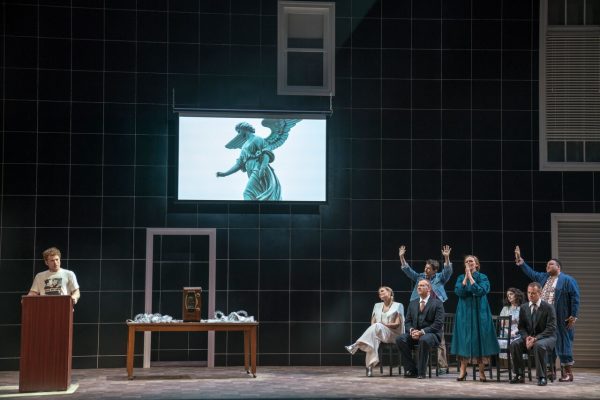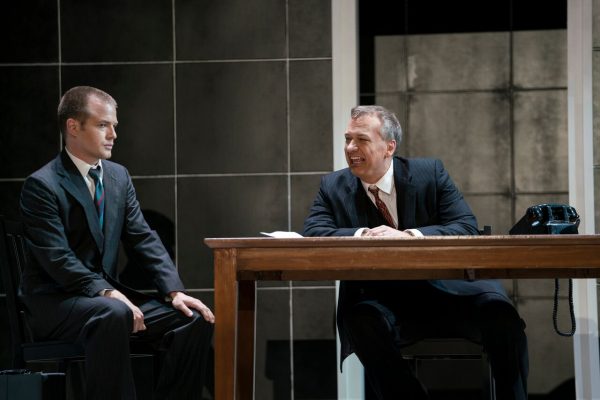New York City Opera closes its 2016-17 season with the bold choice of Hungarian composer Peter Eotvos’ adaptation of Angels in America, Tony Kushner’s two-part epic on the impact of AIDS. Librettist Mari Mezei compresses the seven-hour original into a brisk two-and-a-half hour, single-evening event. Much of Kushner’s complex musings on a myriad of topics from the fall of international communism to Ronald Reagan’s soulless conservatism to the Mormon faith are jettisoned to focus on the interrelationships of the characters, each devastated by the disease and homophobia.

Credit: Sarah Shatz
This is the NYC debut of the work which premiered in Paris in 2004. Since the Broadway productions of the original two parts (Millennium Approaches and Perestroika) in 1993, the massive work has been transformed into an HBO mini-series and received an Off-Broadway revival. This musical version is not as complex or moving as its source material. Eotvos’ atonal score is an acquired taste. There are no traditional romantic soothing melodies. The music is disturbing and unsettling, it captures the sense of displacement experienced by the characters as the calm surface of their daily lives are ripped open by the spread of AIDS and their turbulent inner conflicts are exposed. A diverse musical vocabulary including Mormon hymns, Jewish cantor intonations, pop tunes, and jazz harmony create a cacophonistic tapestry of late-20th century sound. Conductor Pacien Mazzagatti achieves a full and rich orchestral performance, supplemented by a vocal trio in the pit.

Credit: Sarah Shatz
[alert type=alert-white ]Please consider making a tax-deductible donation now so we can keep publishing strong creative voices.[/alert]
Gay law clerk Louis Ironson cannot cope with the AIDS diagnosis of his boyfriend Prior Walter and shatters their relationship as Prior receives visitations from a mysterious angel. Attorney Joe Pitt represses his homosexuality as his wife Harper indulges in pill-induced hallucinations. Powerbroker Roy Cohn, based on the actual right-wing, secretly gay attorney and political operative, hovers over the action like an evil, winged dragon. In Kushner’s plays, Cohn is the dark center of Part One and Prior emerges as the hero of Part Two as he challenges the Angel and God himself for wrecking havoc on mankind. That struggle and dynamic is diminished in Mezei’s condensation but stage director Sam Helfrich and a strong cast create a believable tension.
Andrew Garland is a passionate Prior, Aaron Blake captures Louis’ ambivalence, and Michael Weylandt conveys Joe’s inner struggle. As Cohn, Wayne Tigges skillfully alternates between a dark baritone vocal and nasal spoken sneer. Counter-tenor Matthew Reese is amusingly sassy as the nurse Belize, an imaginary travel agent, and a homeless woman. Sarah Castle is wry and inventive as a Jewish rabbi, impressively vocalizing cantor-ish scales. She is equally memorable as Cohn’s no-nonsense male doctor and Joe’s doting, denying mother. Sarah Beckham-Turner delivers a multi-layered Harper as well as a tart Ethel Rosenberg, the ghost who haunts Cohn. Kirsten Chambers takes full advantage of the octave-tripping trills and leaps Eotvos wrote for the Angel, and endows her with an acerbic wit.
The production only ran four performances at Jazz at Lincoln Center’s Rose Theater. The brief run did not achieve the earth-shattering impact of Kushner’s original but offered only a reminder of the play’s power while employing interesting but not gripping musical terms.
June 10—16. New York City Opera at Jazz at Lincoln Center’s Rose Theatre, Broadway at 60th St., 5th floor, NYC. Running time: two hours and 30 mins. including intermission.
